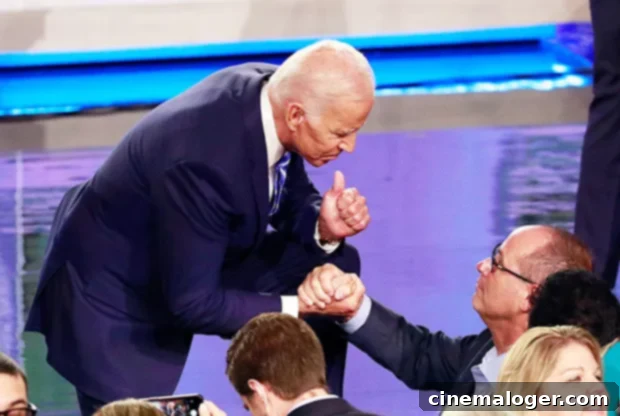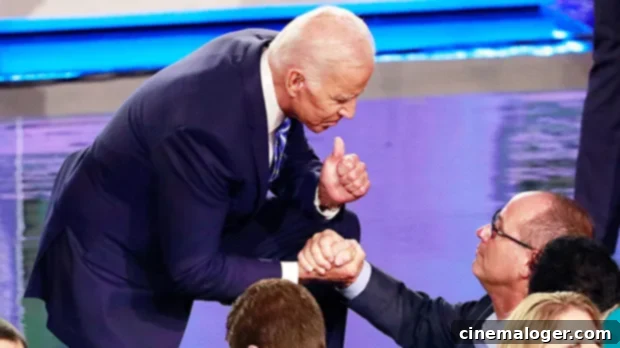Fred Guttenberg’s Enduring Mission: How Joe Biden’s Call Transformed Grief into a Powerful Fight for Gun Safety After Parkland
After experiencing the unimaginable loss of his daughter, Jaime Guttenberg, during the devastating Marjory Stoneman Douglas High School massacre, Fred Guttenberg received a pivotal call from then-Vice President Joe Biden. This profound conversation served as a turning point, inspiring him to channel his overwhelming grief into a resolute purpose: fighting against gun violence and advocating for meaningful change.
On February 14, 2018, the lives of countless families were irrevocably altered when a gunman opened fire at Marjory Stoneman Douglas High School in Parkland, Florida. Among the victims was 14-year-old Jaime Guttenberg. In the immediate aftermath, Fred Guttenberg found himself in a state of profound shock and disbelief, a common response to such senseless tragedy. The scale of the horror was so immense that, initially, he didn’t fully grasp that his beloved daughter and his family had become part of a pervasive and devastating epidemic plaguing America: gun violence. It wasn’t until he stood before a vigil, a gathering of a heartbroken community mourning the students and teachers whose lives were brutally cut short, that the stark reality of the situation truly resonated with him. “It hit me, this was gun violence,” Fred recounted on the HollywoodLife podcast. He vividly remembers declaring, “This time, gun violence came to the wrong community and messed with the wrong dad.” This declaration was not an empty threat but a deeply personal vow, born from the depths of his anguish. That very night, after returning home from the vigil, a determined Fred articulated his new mission: “I don’t know how I’m going to do this, but I’m going to break that f-ing gun lobby.” This resolve, fueled by an unbearable loss, set him on an unexpected path. Just a few days later, a call came that would further solidify his commitment – a call from then-Vice President, now President, Joe Biden.
The vigil in Parkland, Florida, proved to be a transformative moment for Fred. It was there, amidst the collective sorrow, that he discovered his voice. He delivered an impromptu and profoundly impassioned speech, not only memorializing his cherished daughter but also boldly speaking out against the senseless gun slaughter that had claimed so many innocent lives. His raw honesty and powerful message resonated widely, leading to an influx of calls from family, friends, news organizations, fellow activists, and prominent political figures. At a time of intense personal grief, Fred was understandably reluctant to answer calls from unrecognized numbers. However, one afternoon, around 1:30 PM, he received an intriguing message. The caller simply stated, “Hey, Fred, this is Joe Biden and I’d like to talk to you. If you’re interested, I will call you back at exactly six o’clock, and if you pick up and you want to talk, great — if not, I understand.” To Fred’s surprise and respect, the now-President of the United States, known for his punctuality and empathy, called back precisely at 6 PM. What followed was a truly remarkable conversation, lasting an “amazing” 45 to 50 minutes, a discussion that would forever alter the course of Fred’s life and his nascent advocacy.
The conversation with Joe Biden was more than just a condolence call; it was a connection forged in shared experience and understanding. “Joe Biden knows grief,” Fred explained to HollywoodLife, acknowledging Biden’s own profound personal losses, including the passing of his son, Beau Biden. Fred recalled that Biden was on his way to an event for the Beau Biden Foundation, a testament to his continued commitment to honoring his late son’s legacy, even as he reached out to comfort another grieving father. During their discussion, Biden gently asked Fred, “So, what is your plan?” At that moment, Fred’s raw grief and nascent determination hadn’t yet coalesced into a concrete strategy. “I said, ‘I don’t have a plan. I just know I want to break that f-ing gun lobby.’” Biden’s response was not only encouraging but profoundly directional. He affirmed, “You will, you can do it.” More significantly, Biden began to speak to Fred about the critical concepts of “mission and purpose.” It was in that very conversation that the pieces began to fall into place for Fred. He realized, with startling clarity, that his overwhelming pain could be transformed into a powerful, guiding force. “That conversation is when I realized I have a mission and a purpose,” he concluded, recognizing the profound impact of Biden’s empathetic guidance during his darkest hour.

Fred Guttenberg’s journey toward finding purpose in activism had a subtle precursor, unbeknownst to him at the time. The Florida resident revealed that prior to the unspeakable tragedy of the Parkland school shooting, he had already taken a significant break from his professional life. This hiatus was dedicated to caring for his brother, who ultimately lost his arduous battle with a 9/11-related cancer. This experience left Fred in a state of flux. “I was going crazy, I didn’t know what to do. I’m not good at waking up and not having a plan,” he remembered. He was, in essence, already searching for a new direction, a compelling “mission, a purpose,” to anchor his life after a period of intense personal caregiving and loss. Then, tragically, his daughter was killed. This horrific event, combined with his existing search for meaning, created a unique confluence of circumstances. When Joe Biden, with his profound understanding of grief and the importance of active purpose, uttered those transformative words, it had an immediate and crystallizing effect. “When Joe Biden said that to me, it stopped everything else in its tracks and became clear to me this was the only thing that made sense of what I can do going forward,” Fred stated, reflecting on the moment of absolute clarity. From that day forward, his path was clear and unwavering: dedicating his life to preventing similar tragedies and advocating for stronger gun safety measures.
Since that profound conversation and his initial vow, Fred Guttenberg has wholeheartedly devoted himself to his mission: “breaking the f-ing gun lobby.” His commitment has translated into an extraordinary amount of progress, achieved through tireless advocacy and strategic collaboration. Working in close tandem with a wide network of passionate activists, survivor families, and crucially, President Joe Biden, Guttenberg played an instrumental role in pushing Congress to pass the first significant gun control bill in nearly 30 years. This monumental achievement, the Bipartisan Safer Communities Act, was signed into law in June 2022. As reported by The New York Times, the bill represents a critical step forward in addressing the nation’s gun violence crisis. Its provisions are designed to enhance existing safeguards and introduce new preventative measures. Specifically, the bipartisan legislation “will expand the background check system for prospective gun buyers under the age of 21, giving authorities up to 10 business days to examine juvenile and mental health records.” This crucial enhancement aims to prevent firearms from falling into the hands of individuals who may pose a danger. Furthermore, the act “sets aside millions of dollars so states can fund intervention programs, such as mental health and drug courts, and [enact] so-called red flag laws that allow authorities to temporarily confiscate guns from any person found by a judge to be too dangerous to possess them.” These comprehensive measures underscore a multifaceted approach to gun violence prevention, addressing both access to firearms and underlying mental health challenges.
The Bipartisan Safer Communities Act marks a significant shift in federal gun policy, particularly after decades of legislative gridlock. By extending background checks for young adults and providing resources for intervention, it acknowledges the unique risks associated with this demographic and aims to create more robust safeguards. The funding for mental health initiatives recognizes the complex interplay between mental well-being and violence, offering pathways to support and treatment rather than simply punitive measures. Moreover, the encouragement of red flag laws empowers communities and law enforcement to act proactively when individuals demonstrate warning signs of potential harm to themselves or others, a vital tool in preventing future tragedies. These combined elements represent a carefully negotiated package, demonstrating that bipartisan cooperation on gun safety is indeed possible, even in a highly polarized political landscape. Fred Guttenberg’s unwavering advocacy was a driving force in bringing these long-sought changes to fruition, turning his personal tragedy into a catalyst for national progress.
View this post on InstagramA post shared by President Joe Biden (@potus)
Reflecting on the newly enacted legislation, Fred Guttenberg shared a nuanced perspective, articulating what many advocates felt: “A friend of mine who’s running for Congress described the bill as necessary, but not sufficient, and I think that sums it up.” This statement encapsulates the complex reality of legislative progress on gun control. While acknowledging its vital importance, Fred also recognized the inherent compromises required to garner sufficient bipartisan support. One such compromise involved the age restriction for firearm purchases. “While I wished we would have raised the age to [purchase a gun] to 21, we couldn’t get all the votes needed to do that,” he explained. Despite this, the bill still establishes crucial mechanisms designed to enhance safety. It specifically focuses on “putting more attention on those under 21 who are trying to buy these weapons,” significantly extending the rigor and reach of background checks. By formally connecting law enforcement agencies and the FBI into this enhanced process, the legislation creates a stronger net to prevent young individuals, particularly those experiencing a moment of crisis, from acquiring weapons they might use to inflict harm. This targeted approach, though not as broad as some hoped, is expected to have a tangible impact on preventing impulsive or dangerous purchases by a vulnerable demographic, marking a tangible victory for public safety.
The passage of this bill shattered a decades-long impasse in Washington, a barrier that gun safety opponents had long relied upon. “For 30 years, those on the other side always knew and said, ‘You’ll never get anything passed.’ And they knew it. They were right. But we’ve broken through that wall,” Fred stated, a sense of hard-won triumph in his voice. This breakthrough is more than just a legislative victory; it represents a fundamental shift in the political landscape surrounding gun violence. “It’s no longer about whether or not we can get anything passed. Now it’s only about what’s possible, what more we can do to save lives.” This reorientation of the debate from a question of feasibility to a question of potential highlights the renewed optimism and determination of gun safety advocates. Fred Guttenberg passionately asserts that the core of this movement is not about infringing upon the Second Amendment or “restricting rights of gun owners. That’s a bunch of BS. This is about saving lives.” His unwavering message underscores a critical distinction: advocating for responsible gun ownership and common-sense safety measures is fundamentally about protecting communities, preventing tragedies, and honoring the lives lost to preventable violence, rather than engaging in partisan conflict over constitutional rights. This seminal achievement, born from personal tragedy and sustained by profound purpose, stands as a testament to the power of relentless advocacy and the enduring hope for a safer future.
